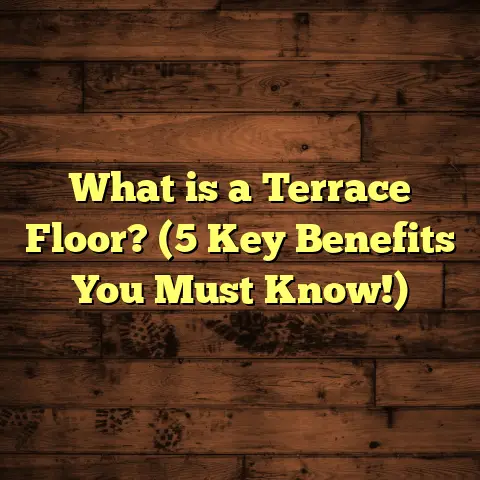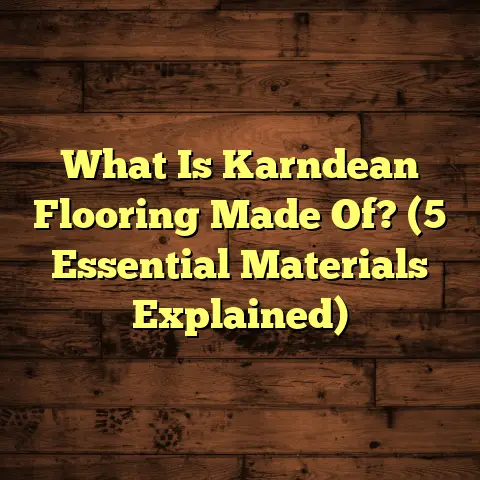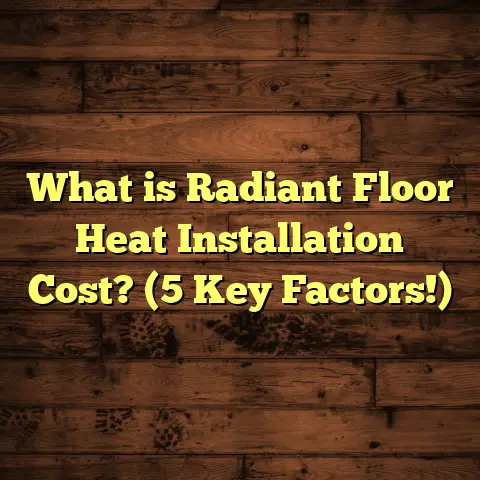What is Epoxy Flooring Cost in India? (5 Factors You Must Know)
I still remember the first time I stepped into a sprawling industrial warehouse in Pune, tasked with installing epoxy flooring. The floor was cracked, oily, and rough. The client wanted something durable but also affordable. As I walked the space, I realized that explaining the cost of epoxy flooring wasn’t just about throwing numbers at them. There were layers of factors influencing the price, and each needed to be understood clearly.
I’ve spent years working on epoxy flooring projects across India — from tiny residential garages in Chennai to huge manufacturing plants in Gujarat. I’ve learned that people often ask: “What is the epoxy flooring cost here?” And more importantly, “Why does it vary so much?”
Let’s chat about this. I’ll break down the five key factors that influence epoxy flooring costs in India and share some stories, insights, and data-backed info to help you get a clear picture. You’ll walk away knowing what to expect and how to plan your budget wisely.
What is Epoxy Flooring?
Before we get into costs, let’s quickly touch on what epoxy flooring actually is.
Epoxy flooring is a protective coating applied over concrete or other substrates, using a mixture of resin and hardener. When combined, these components form a hard, plastic-like surface that bonds tightly to the floor below. This surface can be glossy or matte, smooth or textured.
Unlike ordinary paint, epoxy floors are designed to withstand heavy foot traffic, mechanical wear, chemical spills, and moisture. That’s why you’ll often find them in industrial plants, garages, hospitals, kitchens, and even modern homes or commercial spaces wanting a durable yet attractive finish.
The beauty of epoxy flooring lies not just in its toughness but in its versatility — it can be customized with colors, patterns, textures, and thickness to suit specific needs.
1. Type and Quality of Epoxy Material
When I talk about epoxy flooring cost with clients, this is the first factor I bring up because it directly impacts price and performance.
Types of Epoxy Coatings
There are several types of epoxy materials used in flooring projects:
- Basic Epoxy Coating: This is the standard resin-hardener mix applied as a thin layer (around 1 mm). It’s good for light-use areas like residential garages or small shops but won’t endure heavy industrial wear.
- Self-Leveling Epoxy: Thicker than basic coats (usually 1.5 to 2 mm), self-leveling epoxies create a smooth, glass-like finish that’s great for showrooms, retail outlets, and offices. They require skilled application as the liquid flows evenly to fill cracks and imperfections.
- Mortar Epoxy: This is a mixture of epoxy resin with sand or quartz fillers. It’s extremely tough and can be applied in thicknesses from 3 to 6 mm. Ideal for factories with heavy machinery or warehouses where forklift traffic is common.
- Anti-slip Epoxy: To make floors safer in wet or oily environments, anti-slip additives like aluminum oxide or silica sand are mixed into the epoxy. This option costs more but is worth it for safety compliance.
How Does Material Quality Affect Cost?
When I started out installing floors in Delhi NCR, I used epoxy resins sourced locally that were affordable but lacked consistent quality. Over time, I switched to branded products imported or manufactured by reputed companies like Asian Paints (Apcolite), Pidilite (Fevicol), or BASF.
Higher-quality materials come with better chemical resistance, UV stability (important in sunny cities), and longer life spans. These factors reduce long-term maintenance costs.
Cost Range by Material Type (INR per sq.ft):
| Epoxy Type | Lower Price Range | Higher Quality Price Range |
|---|---|---|
| Basic Epoxy | ₹50 – ₹70 | ₹80 – ₹100 |
| Self-leveling Epoxy | ₹80 – ₹120 | ₹130 – ₹160 |
| Mortar Epoxy | ₹100 – ₹150 | ₹160 – ₹220 |
| Anti-slip Epoxy | ₹90 – ₹130 | ₹140 – ₹180 |
Real Example from My Projects
In 2023, I installed mortar epoxy flooring for a pharma manufacturing unit in Gujarat covering 3,000 sq.ft. The client initially wanted a cheaper basic epoxy but I advised against it due to their heavy equipment use. Opting for mortar epoxy increased their upfront cost by about 40%, but after 18 months, no major repairs were needed despite strict hygiene and chemical exposure requirements.
What You Can Do
- Ask suppliers for material datasheets and certifications.
- Avoid very cheap epoxy resins—they may peel or yellow quickly.
- Consider longevity vs upfront cost—sometimes paying more upfront saves thousands later.
2. Floor Size and Preparation Work
How big your floor is will obviously affect total cost — that’s simple math. But what often surprises people is how much the condition of the floor before applying epoxy influences price.
Why Floor Prep Matters So Much
I once had a client in Hyderabad who wanted epoxy coating on a 2,000 sq.ft warehouse floor that hadn’t been cleaned or maintained for years. It was cracked, had oil stains, paint flakes, and uneven patches.
The preparation involved:
- Grinding down rough spots
- Cleaning oil and dust thoroughly
- Filling cracks with epoxy mortar
- Applying primer coats
This prep work took longer than expected—about three days—and added roughly 45% more to the total project cost compared to a similar-sized clean floor.
Typical Floor Conditions & Prep Cost Impact
| Floor Condition | Common Prep Tasks | Approximate Cost Increase |
|---|---|---|
| New & smooth | Sweeping + primer | 5% – 10% |
| Old but fair | Grinding + crack filling | 15% – 30% |
| Damaged/oily/uneven | Grinding + patching + cleaning | 30% – 50% |
Personal Tip From Experience
I always advise clients to invest time and money in preparing their floors properly—skip this step and you might end up with peeling floors that look terrible within months.
3. Labor Charges: Location & Skill Matter
Labor charges vary widely across India depending on whether you’re in Mumbai or a smaller town like Coimbatore.
How Location Influences Labor Costs
In metro cities like Mumbai, Bengaluru, or Delhi:
- Skilled labor rates for epoxy application typically range from ₹40 to ₹60 per sq.ft.
- Contractors often include surface prep charges separately.
- Labor unions or regulations sometimes push rates higher.
In smaller towns such as Jaipur or Lucknow:
- Rates can be as low as ₹20 to ₹35 per sq.ft.
- Finding highly skilled installers may be harder.
What About Skill Level?
Epoxy flooring requires careful mixing of resin and hardener in exact ratios and timely application before curing starts. Poor workmanship leads to bubbles, uneven surfaces, or premature failure.
One time in Kolkata, I took over a project where untrained workers applied epoxy too thickly without grinding first—the floor cracked within six months!
How I Manage Labor Charges
I recommend getting at least three quotes from local contractors with proven experience. Ask for photos/videos of past work and client references. Sometimes paying a bit extra for skilled labor pays off immensely.
4. Thickness & Number of Coats
Epoxy flooring isn’t a one-coat job—there are multiple layers applied for strength and finish.
Typical Layer Structure
- Primer Coat: Seals the concrete so epoxy adheres better
- Intermediate Coats: Build thickness and durability
- Topcoat: Provides final protective layer; UV resistant or glossy
Thickness varies depending on use:
| Use Case | Thickness Range (mm) |
|---|---|
| Residential Garage | 1 – 1.5 |
| Commercial Showroom | 1.5 – 2 |
| Industrial Warehouse | 2 – 4 |
| Heavy Machinery Areas | 4+ |
Increasing thickness means more resin and labor hours:
| Thickness (mm) | Cost per Sq.ft (INR) |
|---|---|
| 1 – 1.5 | ₹50 – ₹80 |
| 2 – 3 | ₹90 – ₹130 |
| Above 3 | ₹140+ |
My Experience With Thickness Choices
A client running an automotive workshop in Chennai wanted thick epoxy floors so oil spills wouldn’t penetrate cracks. We applied a 3 mm layer using mortar epoxy with anti-slip additives. The cost was around ₹180 per sq.ft compared to ₹70 per sq.ft for basic residential-grade floor.
This thicker floor has held up well over two years despite heavy vehicle use.
5. Custom Features & Add-ons
Epoxy flooring can be customized easily with colors, textures, logos, or safety features — but these extras add to costs.
Common Customizations
- Color Pigments: Adding vibrant colors makes floors stand out.
- Decorative Flakes/Quartz: Sprinkle flakes during application for textured effects.
- Anti-slip Additives: Essential for wet kitchens or hospitals.
- Logos or Patterns: Great for branding retail spaces or corporate offices.
- UV-resistant Topcoats: Prevent yellowing under sunlight exposure.
Typical Extra Costs
| Feature | Extra Cost per Sq.ft (INR) |
|---|---|
| Colored Pigments | ₹10 – ₹20 |
| Decorative Flakes/Quartz | ₹15 – ₹30 |
| Anti-slip Additives | ₹10 – ₹15 |
| Custom Logos/Patterns | Varies (₹30+) |
Story From My Portfolio
In Hyderabad last year, I installed epoxy flooring in a tech startup’s office lobby using a custom marbled pattern with blue and white flakes plus their company logo embedded near the entrance.
Though this customization added about 25% to the budget compared to plain floors (₹150 vs ₹120 per sq.ft), the client loved how it boosted their brand image during client visits.
Breaking Down Costs by Region: Data Insights
Using data from my projects across India combined with market research:
| City | Average Basic Epoxy Cost (₹/sq.ft) | Average Industrial Epoxy Cost (₹/sq.ft) | Labor Cost Range (₹/sq.ft) |
|---|---|---|---|
| Mumbai | 70 – 90 | 120 – 180 | 40 – 60 |
| Bengaluru | 60 – 85 | 110 – 170 | 35 – 55 |
| Delhi NCR | 65 – 80 | 100 – 160 | 40 – 55 |
| Pune | 55 – 75 | 95 – 150 | 30 – 50 |
| Chennai | 50 – 70 | 90 – 140 | 25 – 45 |
| Tier-2 Cities* | 40 – 60 | 80 – 120 | 20 – 35 |
*Tier-2 cities include Jaipur, Lucknow, Coimbatore etc.
How To Estimate Your Epoxy Flooring Budget
Let me share a simple formula I use when clients want rough estimates before site visits:
Total Cost = Floor Area × (Material Cost + Labor Cost + Prep Cost %)
Say you have a garage of 1,200 sq.ft in Chennai:
- Material cost (basic epoxy): ₹60/sq.ft
- Labor cost: ₹30/sq.ft
- Prep cost (moderate): +20%
Calculation:
- Material + labor = ₹60 + ₹30 = ₹90/sq.ft
- Add prep cost = ₹90 + (20% of ₹90) = ₹90 + ₹18 = ₹108/sq.ft
- Total for area = ₹108 × 1,200 = ₹1,29,600
So roughly ₹1.3 lakhs would be your starting budget.
Maintenance Costs After Installation
It’s not just installation that costs money; maintenance matters too if you want your floor looking great for years.
Routine Care Tips I Share With Clients
- Clean regularly with mild detergent; avoid harsh chemicals.
- Fix small cracks immediately using patch kits.
- Avoid dragging heavy machinery without protection.
- Reapply topcoat every few years depending on wear.
Maintenance expenses usually range between ₹5-10 per sq.ft annually if you follow these tips well.
Common Mistakes That Can Increase Costs
Over the years I’ve seen projects go wrong because of avoidable mistakes:
- Choosing cheapest material without checking quality
- Skipping floor prep to save money
- Hiring untrained laborers
- Ignoring thickness requirements
- Neglecting safety features like anti-slip coatings
Each mistake can cause costly rework or shorten floor life.
Final Words From My Experience
Epoxy flooring is a fantastic investment if done right—it adds durability, looks amazing, and can increase property value.
Costs vary widely based on material type/quality, site prep needs, labor charges by location/skill level, thickness/layers applied, and any customization you want.
You can expect:
- Basic residential floors from ₹50 to ₹80 per sq.ft
- Industrial-grade floors from ₹100 to over ₹200 per sq.ft
- Surface prep can add up to half the total cost if floor condition is poor
I always advise clients: don’t cut corners on prep or materials; spend wisely on skilled labor; think long-term rather than just upfront price.
If you want help figuring out your project’s cost or understanding your options better based on your city and needs, just ask! I’m happy to share tailored advice from my years of hands-on experience across India’s diverse flooring projects.
That’s my take on epoxy flooring costs across India with real stories and data you can trust. Planning well means fewer surprises and more beautiful floors that last!





